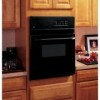GE JRS06BJBB Installation Instructions - Page 1
GE JRS06BJBB - 24 Inch Single Electric Wall Oven Manual
 |
UPC - 084691098744
View all GE JRS06BJBB manuals
Add to My Manuals
Save this manual to your list of manuals |
Page 1 highlights
INSTALLATION INSTRUCTIONS FOR YOUR NEW 24" BUILT-IN OVEN Before you begin - Read these instructions completely and carefully. IMPORTANT - Save these instructions for local inspector's use. IMPORTANT - OBSERVE ALL GOVERNING CODES AND ORDINANCES. Note to Installer - Be sure to leave these instructions with the Consumer. Note to Consumer - Keep these instructions with your Use and Care Guide for future reference. ATTENTION INSTALLER - All ovens must be hard wired (direct wired) into an approved junction box. A "plug and receptacle" is not permitted on these products. FOR YOUR SAFETY ELECTRICAL REQUIREMENTS Be sure your oven is installed properly by a qualified installer or service technician. • Be sure the oven is securely installed in a cabinet that is firmly attached to the house structure. Weight on the oven door could cause the oven to tip, resulting in serious personal injury or death. Never allow anyone to climb, sit, lean, stand or hang on the oven door. • The wall coverings, countertop and cabinets around the oven should be able to withstand the heat (up to 200°F) generated by the oven. TOOL LIST CAUTION: The electrical power to the oven supply line must be shut off while STOP! connections are being made. Failure to do STOP! so could result in serious injury or death. This appliance must be supplied with the proper voltage and frequency, and connected to an individual, properly grounded branch circuit, protected by a circuit breaker or fuse having amperage as noted on rating plate. (Rating plate is located on front frame.) Rating Plate Location • 1/8" Drill Bit • Ruler • Electric or Hand Drill • Hand or saber saw • Flat Blade screwdriver • Pencil We recommend you have the electrical wiring and hookup of your oven done by a qualified electrician. After installation, LOCATION have the electrician show you where your main oven disconnect is located. Cabinet space must be provided to enclose the recessed part of your built-in oven. SINGLE OVEN INSTALLATION - See Figure 1 for all necessary dimensions. DOUBLE OVEN INSTALLATION - See Figure 2 for all necessary dimensions. It is best to make a template to insure accurate cutting. Place the bottom of the template on a level base line, above the floor. See dimension E in Figure 1 (Single Oven) or Figure 2 (Double Oven). It is important that the oven be installed at or above the minimum height specified. The unit has been tested and approved, in accordance with safety standards, at this height. Check with your local utilities for electrical codes which apply in your area. Failure to wire your oven according to governing codes could result in a hazardous condition. If there are no local codes, your oven must be wired and fused to meet the requirements of the National Electrical Code, ANSI/NFPA No. 70-Latest Edition. You can get a copy of the National Electrical Code, ANSI/NFPA NO. 70-Latest Edition by writing: National Fire Protection Association Batterymarch Park Quincy, MA 02269 Effective January 1, 1996, the National Electrical Code requires that new, but not existing, construction utilize a 4 conductor connection to an electric oven. When installing an electric oven in new construction, a mobile home, recreational vehicle or an area where local codes prohibit grounding through the neutral conductor, follow the instructions in NEW CONSTRUCTION AND FOUR-WIRE CORD CONNECTION KIT. You must use a three-wire, single-phase A.C. 208Y/120 Volt or 120/240 Volt, 60 Hertz electrical system. If you 31-10658 (456 JR) connect to aluminum wiring, properly installed connections 1 approved for use with aluminum wiring must be used.







